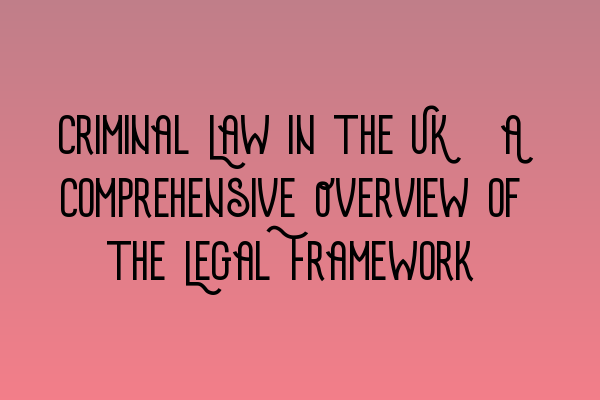Criminal Law in the UK: A Comprehensive Overview of the Legal Framework
Welcome to SQE Criminal Law & Practice Law UK! If you are looking for a comprehensive overview of the legal framework surrounding criminal law in the UK, you have come to the right place. In this blog post, we will dive deep into the various aspects and principles of criminal law, providing you with a solid understanding of the subject matter.
Understanding Criminal Law
Criminal law, also known as penal law, refers to the body of legislation and regulations that governs crimes and their punishments. It entails the definition of criminal offenses, the procedures for prosecuting individuals accused of these offenses, and the penalties that may be imposed upon conviction.
One of the fundamental principles of criminal law is that a person is innocent until proven guilty. This principle acts as a cornerstone of the criminal justice system in the UK, ensuring that individuals are not falsely accused or unjustly punished.
In order to establish guilt in a criminal case, the prosecution must prove the accused’s guilt beyond a reasonable doubt. This high standard of proof emphasizes the importance of fair trials and the need for solid evidence in criminal cases.
Types of Criminal Offenses
Under the UK legal framework, criminal offenses can be classified into several categories:
- Property Crimes: Offenses such as theft, burglary, and arson that involve the unlawful taking or damaging of another person’s property.
- Violent Crimes: Offenses that cause physical harm or involve intent to cause harm, including assault, murder, and manslaughter.
- Drug Crimes: Offenses related to the possession, production, and distribution of illegal substances.
- White-Collar Crimes: Non-violent crimes committed by individuals in professional or business settings, such as fraud, embezzlement, and bribery.
- Sexual Offenses: Offenses related to sexual misconduct, including rape, sexual assault, and child exploitation.
The Criminal Justice Process
When a criminal offense is committed, the following steps are typically involved in the criminal justice process:
- Investigation: Law enforcement agencies gather evidence and information to identify the suspect.
- Arrest: The suspect is apprehended and taken into custody.
- Charging: The prosecution formally accuses the accused of committing a crime.
- Arraignment: The accused appears in court to enter a plea.
- Trial: Both the prosecution and the defense present their arguments and evidence before a judge or jury.
- Verdict: The judge or jury renders a decision of guilt or innocence.
- Sentencing: If convicted, the appropriate punishment is determined by the court.
- Appeal: The convicted individual may challenge the verdict or sentence in a higher court.
It is worth mentioning that this is a simplified overview of the criminal justice process, which can vary depending on the circumstances of each case.
Legal Representation and Rights
Throughout the criminal justice process, individuals have the right to legal representation. A solicitor or barrister acts on behalf of the accused, providing advice, examining evidence, and representing their interests in court.
Moreover, individuals accused of a crime have certain legal rights, including:
- The right to remain silent and not self-incriminate.
- The right to a fair trial.
- The right to confront witnesses.
- The right to legal counsel.
- The right to appeal.
These rights are designed to protect an individual’s civil liberties and ensure a just and equitable legal process.
Conclusion
Criminal law is a complex and dynamic field that plays a crucial role in maintaining social order and holding individuals accountable for their actions. In this blog post, we have provided you with a comprehensive overview of the legal framework surrounding criminal law in the UK.
If you are interested in further exploring the topic of criminal law or preparing for the SQE exams, we recommend checking out our related articles:
- SQE 1 Practice Exam Questions
- SQE 1 Practice Mocks FLK1 FLK2
- SQE 2 Preparation Courses
- SQE 1 Preparation Courses
- SRA SQE Exam Dates
Thank you for reading and we hope this overview has provided you with valuable insights into criminal law in the UK.
